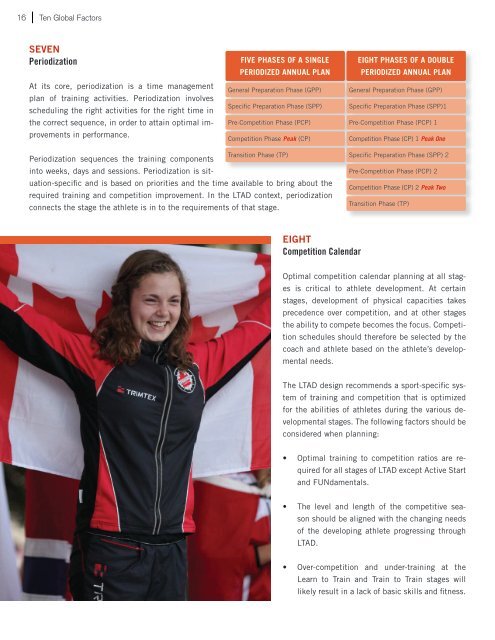train to win - Canadian Orienteering Federation
train to win - Canadian Orienteering Federation
train to win - Canadian Orienteering Federation
You also want an ePaper? Increase the reach of your titles
YUMPU automatically turns print PDFs into web optimized ePapers that Google loves.
16 Ten Global Fac<strong>to</strong>rs Ten Global Fac<strong>to</strong>rs 17<br />
SEVEN<br />
Periodization<br />
At its core, periodization is a time management<br />
plan of <strong>train</strong>ing activities. Periodization involves<br />
scheduling the right activities for the right time in<br />
the correct sequence, in order <strong>to</strong> attain optimal improvements<br />
in performance.<br />
FIVE PHASES OF A SINGLE<br />
PERIODIZED ANNUAL PLAN<br />
General Preparation Phase (GPP)<br />
Specific Preparation Phase (SPP)<br />
Pre-Competition Phase (PCP)<br />
Competition Phase Peak (CP)<br />
Transition Phase (TP)<br />
Periodization sequences the <strong>train</strong>ing components<br />
in<strong>to</strong> weeks, days and sessions. Periodization is situation-specific<br />
and is based on priorities and the time available <strong>to</strong> bring about the<br />
required <strong>train</strong>ing and competition improvement. In the LTAD context, periodization<br />
connects the stage the athlete is in <strong>to</strong> the requirements of that stage.<br />
EIGHT<br />
Competition Calendar<br />
EIGHT PHASES OF A DOUBLE<br />
PERIODIZED ANNUAL PLAN<br />
General Preparation Phase (GPP)<br />
Specific Preparation Phase (SPP)1<br />
Pre-Competition Phase (PCP) 1<br />
Competition Phase (CP) 1 Peak One<br />
Specific Preparation Phase (SPP) 2<br />
Pre-Competition Phase (PCP) 2<br />
Competition Phase (CP) 2 Peak Two<br />
Transition Phase (TP)<br />
Optimal competition calendar planning at all stages<br />
is critical <strong>to</strong> athlete development. At certain<br />
stages, development of physical capacities takes<br />
precedence over competition, and at other stages<br />
the ability <strong>to</strong> compete becomes the focus. Competition<br />
schedules should therefore be selected by the<br />
coach and athlete based on the athlete’s developmental<br />
needs.<br />
The LTAD design recommends a sport-specific system<br />
of <strong>train</strong>ing and competition that is optimized<br />
for the abilities of athletes during the various developmental<br />
stages. The follo<strong>win</strong>g fac<strong>to</strong>rs should be<br />
considered when planning:<br />
• Optimal <strong>train</strong>ing <strong>to</strong> competition ratios are required<br />
for all stages of LTAD except Active Start<br />
and FUNdamentals.<br />
• The level and length of the competitive season<br />
should be aligned with the changing needs<br />
of the developing athlete progressing through<br />
LTAD.<br />
• Over-competition and under-<strong>train</strong>ing at the<br />
Learn <strong>to</strong> Train and Train <strong>to</strong> Train stages will<br />
likely result in a lack of basic skills and fitness.<br />
• The appropriate level of competition is critical <strong>to</strong> the technical, tactical and mental development of the athlete at all<br />
stages.<br />
• The competition and <strong>train</strong>ing needs of athletes may not always be met by using a simplified version of a senior competition<br />
format.<br />
• A systematic competition and <strong>train</strong>ing review needs <strong>to</strong> be undertaken periodically with regard <strong>to</strong> national, provincial<br />
and club calendar planning in order <strong>to</strong> provide the best possible pathway for athletes involved in all stages of LTAD.<br />
NINE<br />
System Alignment<br />
• Junior Development programs<br />
• Local club competitions (formerly C meets)<br />
• Provincial championships and inter-club events (formerly B meets)<br />
• Western and Eastern <strong>Canadian</strong> championships, Canada Cup series (formerly<br />
A meets)<br />
• National championships and North American championships<br />
• Junior World championships<br />
• World championships<br />
Sport Canada’s LTAD concept is a framework for full sport system alignment in Canada, integrating health and education<br />
with sport and physical activity. It is also a <strong>to</strong>ol for motivating change <strong>to</strong>wards more effective organization, alignment and<br />
integration within each national sport organization. It is important that all members of the orienteering community work<br />
<strong>to</strong>gether <strong>to</strong> implement the right programs and ensure a sport system that will produce optimal conditions for participation,<br />
skill development, <strong>train</strong>ing and competition.<br />
• LTAD has a strong impact on the coaching education curriculum. Developmental readiness and participant capability<br />
will replace ad hoc decision-making about programming.<br />
• LTAD has a strong impact on officials’ development. Competition types and classes, awards, and course setting all<br />
have <strong>to</strong> reflect the developmental age of the athlete.<br />
The new LTAD concept is key <strong>to</strong> <strong>Orienteering</strong> Canada’s new Strategic Plan. It will ultimately provide the framework for all<br />
of <strong>Orienteering</strong> Canada’s programs.


